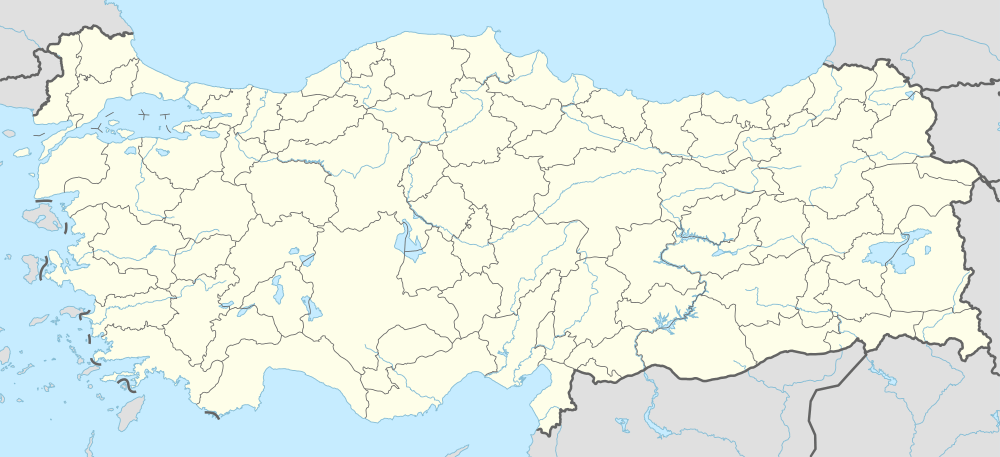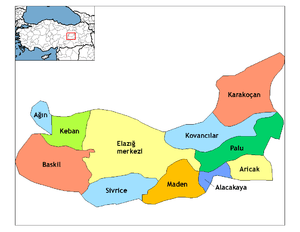Ağın
| Ağın | |
|---|---|
 Ağın | |
| Coordinates: TR 38°56′32″N 38°42′56″E / 38.94222°N 38.71556°ECoordinates: TR 38°56′32″N 38°42′56″E / 38.94222°N 38.71556°E | |
| Country | Turkey |
| Province | Elazığ |
| Government | |
| • Belediye Başkanı | Yılmaz Serttaş (MHP) |
| • Kaymakam | Levent YETGİN |
| Area[1] | |
| • District | 215.54 km2 (83.22 sq mi) |
| Population (2012)[2] | |
| • Urban | 1,717 |
| • District | 2,721 |
| • District density | 13/km2 (33/sq mi) |
| Post code | 23960 |
| Climate | Csa |
| Website |
www |
Ağın is a town and district of Elazığ Province of Turkey. The mayor is Yılmaz Serttaş Nationalist Movement Party (MHP). The population of the town is 1844 as of 2010.
History
The city of Ağın was initially founded by Armenians who had migrated there from Iran. In 1896, the city was evenly divided between Muslims and Armenians. The city was recognized for its wealth and had previously escaped the 1895-1896 Hamidian massacres through a ransom payment by the Armenians of 1500 Turkish gold pounds.[3]
On September 15, 1896, three weeks after the raid of the Ottoman Bank by Armenian Dashnaks as a response to the Hamidian massacres, Turkish authorities organized a new massacre in the city of Ağın. Ottoman troops killed "upwards of 2000 Armenians" including "many women and children" according to a report by the French Ambassador.[3] Of the 1500 houses located in the Armenian quarter of Ağın, 980 were pillaged and burned. Ağın was chosen to be the target of the massacre because the leader of the bank raiding party who was killed at the start of the raid, Papken Siuni, was native to the city of Ağın. According to a report by the British Consul at Harput, the pretext used to attack the city's Armenian quarter was that the Armenians of the said city were "set to cause trouble". The same report by the Consul said that there were no revolutionary movement whatever and no powder magazine exploded during the massacre. A few pistols and revolvers were found in the ruins of the burnt houses.[3]
Access
Access to Ağın from the province center Elazığ was provided in the past by Karamağara Bridge, a Roman arch bridge in 10 km (6.2 mi) distance spanning the Arapgir Creek. The bridge was dismantled, and its ashlar were moved to Elazığ Museum when the flooding of the Keban Dam reservoir began in 1974. Ağın was accessible only by ferryboat over a period of forty years before the Ağın Bridge was built and opened to traffic in 2015.[4][5][6] The newly built bridge is also named the "Ağın (Karamağara) Bridge" in remembrance of the non-existing old bridge. [4]
References
- ↑ "Area of regions (including lakes), km²". Regional Statistics Database. Turkish Statistical Institute. 2002. Retrieved 2013-03-05.
- ↑ "Population of province/district centers and towns/villages by districts - 2012". Address Based Population Registration System (ABPRS) Database. Turkish Statistical Institute. Retrieved 2013-02-27.
- 1 2 3 Dadrian, Vahakn N. (2003). The History of the Armenian Genocide. Berghahn Books. p. 146. ISBN 1-57181-666-6.
- 1 2 "Türkiye'nin en uzun dördüncü asma köprüsü tamamlandı". Hürriyet (in Turkish). 2015-10-20. Retrieved 2016-08-13.
- ↑ "Ağın Köprüsü Trafiğe Açıldı". Haber Elazığ (in Turkish). 2015-10-26. Retrieved 2016-08-13.
- ↑ "Ağın köprüsü ne zaman bitecek?". Kanal 23 (in Turkish). 2013-03-23. Retrieved 2016-08-13.
